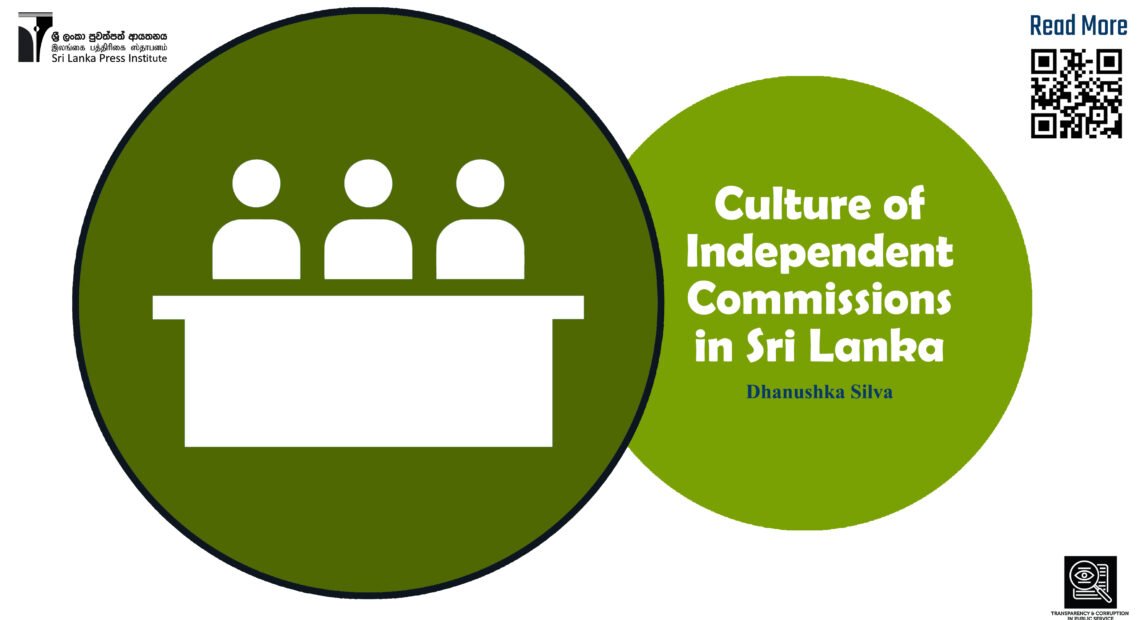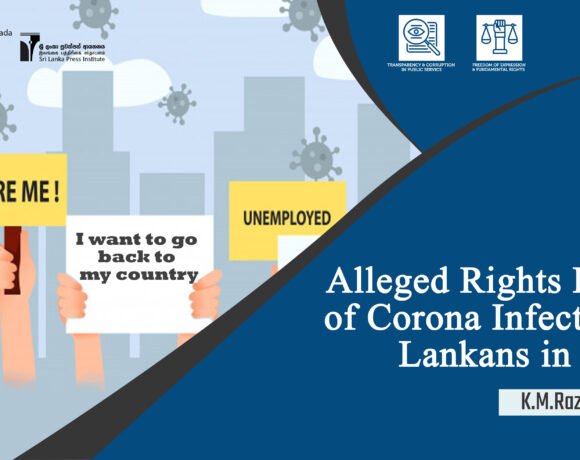
Culture of Independent Commissions in Sri Lanka
Dhanushka Silva
The role of any person serving as the president of the Republic is to act as an agent of state power under the second republican Constitution of Sri Lanka. Why do we then have presidents who like to act like as the kingpins of power? In fact, the executive president is constitutionally empowered to make appointments for two other branches, namely legislature and judiciary. This is an eternal segment in Sri Lankan styled of governance that has being appeared in our constitutional landscape for the last four decades except two instances. The two instances were 2001-2004 phase as well as 2015 Yahapanalana governance, both were fragile political matricesmatrixes in nature.
The constitutional architectures, as against galvanization of state power over the Presidency, lets few other important bodies to act independently on the assumption that keeping institutional integrity of certain public bodies may lead to development in governance. The popular arguments are generally brought in bringing to justify the establishment of independent commissions, are; keeping major public bodies and their functions beyond the political interests (especially, the political party in the power), providing opportunities to subject specialists to get along with public functions regardless of political pressure, and enlargement of public faith over such bodies. Establishment of independent commissions has is possibly placed considerable restrictions on the discretionary powers of the Executive President in making appointments to high offices. Two of long standing examples that have been validated above arguments are The University Grant Commission and Legal Aid Commission established in 1978.
The emerging democracy loving culture (named as ‘White Lotus Movement’) in the first half of the 90s, mainly led by the first ever Sri Lankan lady president Chandrika Bandaranayake, claimed the sheer need for the of establishment of more independent commissions to make certain public functions more transparent. The Human Rights Commission and the Commission to inquire into Allegation of Bribery or Corruption were the first two commissions established during this time.
The draft Constitution of 2001 proposed to bring up these independent commissions under the Constitutional Council that was inter alia responsible for the appointment of commissioners. Alas, the whole constitutional reformation process in 2001 was failed and consequently this draft Constitution was not also adopted. However, the Constitutional Council, the centerpiece of the Constitutional draft was in place despite thoughthet adoption process of the Constitution itself didn’t succeedwent wrong. There were seven independent commissions established under the subsequent 17th Amendment. They namely were: Election Commission, Public Service Commission, National Police Commission, Human Rights Commission, Permanent Commission to Investigate Allegations of Bribery or Corruption, Finance Commission, and Delimitation Commission. During this time, the National Police Commission and Human Rights Commission played a dynamic role in the process of democratization of state power whilst other commissions were not as proactive. Major criticism brought against the experimentation of independent commissions was they were located in a cynically politicized polity that couldn’t help up to meet basic independent requirements. For instance, the Human Rights Commission was downgraded by the International Coordinating Committee for of National Institutions for the promotion and protection of Human Rights due to a lack of transparency. Especially, the role (promotion of human rights) played by the HRC in the last phase of armed conflict, was quite problematic.
The culture of the independent commission was rolleds back under the draconian 18th Amendment. The amendment totally erased the previous limitations imposed on the exercise of the president’s discretion that restricted his appointment power. The 19th Amendment paved the way for occupying independent commissions among other several constitutional reforms in Sri Lankan polity once again. As noted above, the 17th Amendment introduced 7 independent commissions in numbers. Two new commissions were created bringing total numbers to 9 under the 19th Amendment. The Audit Service Commission and the National Procurement Commission were placed in order to regulate the audit service and public procurement process. Another significant introduction in line with the 19th Amendment was the Right to Information Commission under Right to Information Act No.12 of 2016. Some of major constitutional inventions were also brought aiming at the institutional integrity of the commissions. Article 104CC of the Amendment stated made that any public authorities acting as against to the directives of the Election Commission amidst an election in particular would be a punishable offence. The Judicial Service commission that was dealing with the appointments and disciplinary actions of the lower courts is led by the Chief Justice and two other judges of the Supreme Court. These new developments inevitably lead to enhance not only institutional integrity but also their scope in general. Moreover, appointment of commissioners based on their merit is always a prerequisite for the commissions to be independent. The president can make no appointment for the commissions unless he receives the recommendations from the Constitutional Council. It is clear, this reform seeks to keep power of recommendations by the Constitutional Council beyond power of appointment by the Executive President. The 20th Amendment reintroduceds the Parliamentary Council that existed under the 18th Amendment. The Parliamentary Council is not an inclusive or independent constitutional body as like as the Constitutional Council waswere, is obliged to observe who fit to be commissioners. The President, in making appointments for the Independent Commissions is, requireds to have observations of the Council. Notably, observations don’t have not a binding effect. In case of an appointment, the council will have to give its observation within one week. If they fail to do so, the president will proceed with the appointment as his wish. Another change proposed by the 20th Amendment is the, complete removal of the National Procurement Commission as well as the Audit Service Commission.








